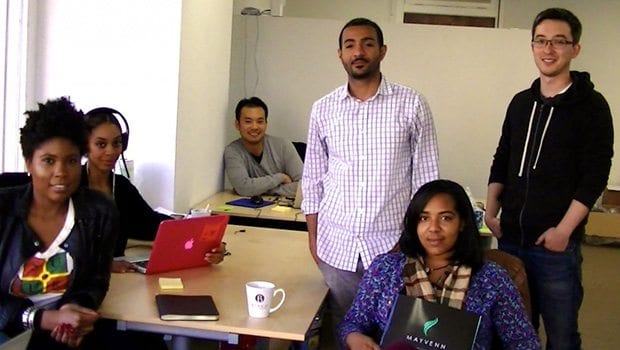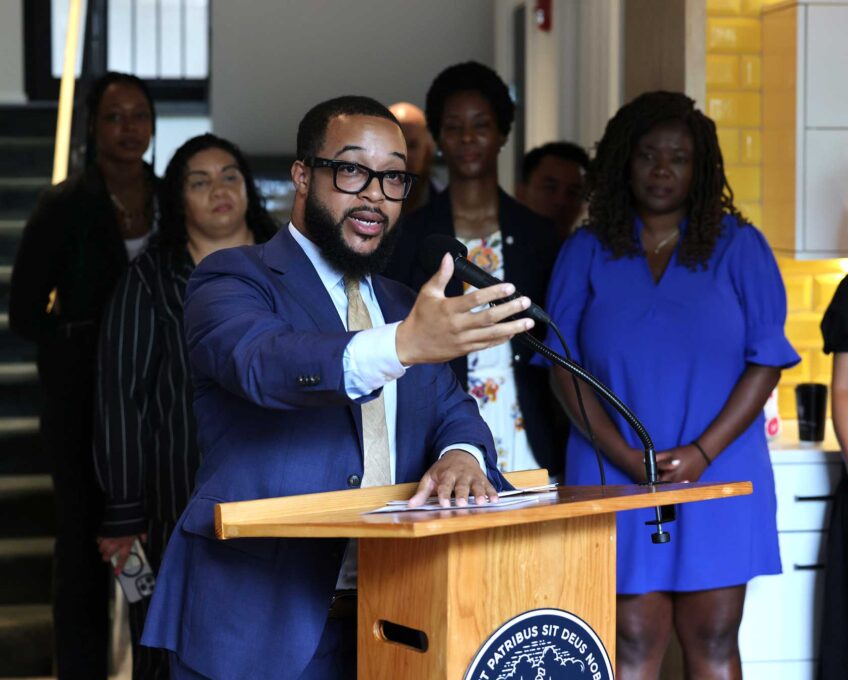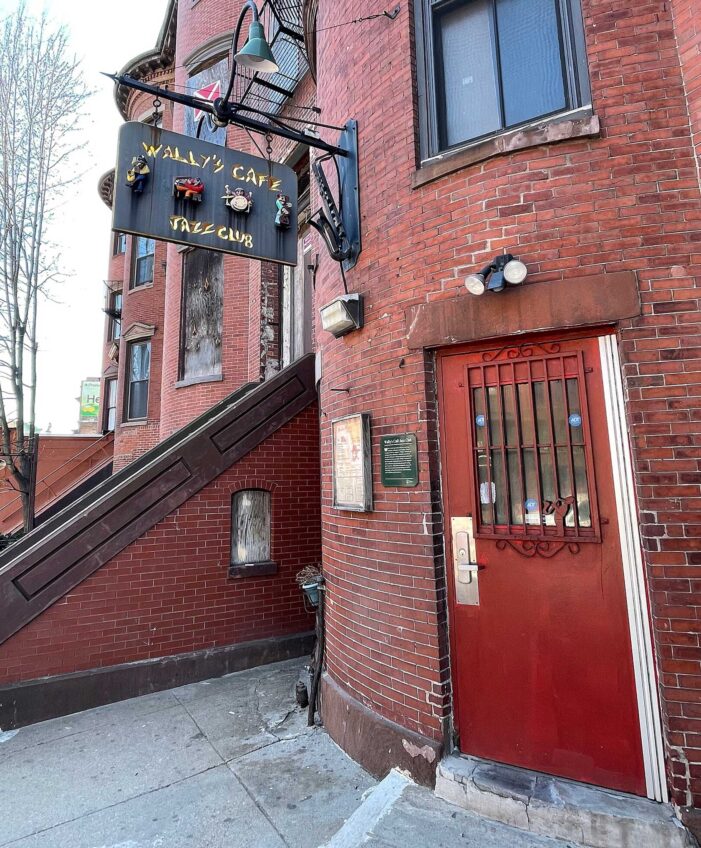
Oakland-based Mindblown Labs put gaming into education and garnered the largest Kickstarter campaign for any mobile game ever. E-commerce site Mayvenn found an unserved market and is growing 40 percent to 60 percent a month in revenues, and GroupFlix is already being described as another Netflix, prelaunch.
These tech startups are all in Oakland. And they were all started by African Americans.
There’s a burgeoning tech industry in Oakland, with a host of startups joining a dozen midsize tech companies and Oakland’s two technology giants, Pandora and Ask. Oakland is becoming a place where tech happens, not on the scale of San Francisco or Silicon Valley, but enough to be a contender when startups figure out where to locate.
What’s more, and a potential game changer in technology, is that Oakland’s tech industry appears to be more diverse than the largely white male and Asian male tech industries across the bay and down the peninsula, based on the concentration of startups by people of color and women in the small tech eco-sphere here. SleekGeek was started by a Latina, XEO Designs by a woman, 2Locos by a team finding that their Latino lifestyle tastes are unanswered on e-commerce sites.
Also, startups in Oakland are often driven by a social mission. Mindblown Labs aims to teach youth about financial literacy. GoldieBlox, started by women, hopes to inspire young girls to become engineers. Qeyno Labs, started by another African American, is a career discovery game for underserved kids needing mentors. Solar Mosaic is making solar electricity affordable for regular people and nonprofits. Impact HUB Oakland is providing a collaboration and innovation workspace for multicultural tech endeavors. SleekGeek hopes to get kids more engaged in learning science through mobile apps.
“You see a lot of education startups planting roots here and some other social impact oriented startups, so you have a differentiating number here,” said Jason Young, co-founder of Mindblown Labs as well as the Hidden Genius Project, which teaches coding to young African Americans. “It doesn’t hurt that we have Kapor Capital and New Schools Venture Fund.” Both are venture capital firms interested in funding initiatives that widen opportunity.
It’s also no accident that his nonprofit the Hidden Genius Project is located in Oakland, or that Black Girls Code which teaches young girls to code, moved to Oakland. In fact, President Obama invited two Oakland tech entrepreneurs to his “My Brother’s Keeper” initiative launch, along with Oakland’s mayor.
At a time when the tech industry is sometimes vilified as elitist and indifferent to the housing needs and community ties of the average Bay Area worker, Oakland may be spearheading a more inclusive chapter in technology industry growth. The firms mentioned above are just a partial list of those started by people outside of the usual tech demographic.
But for Oakland’s tech industry to continue to grow, and do so in the quintessentially Oakland way as a diverse and social mission driven sector, will take intention, many experts say.
“Oakland is still iterating, the story is still largely being written,” Young said. “In terms of maintaining diversity and social impact, that definitely has to be nurtured,” he said. Otherwise, it could just be a San Francisco spill over.
Cedric Brown, managing partner of the Kapor Center for Social Impact, which moved here to pursue its mission of fostering diversity and opportunity in technology, agrees. He sees Oakland’s “rich social justice culture, its Silicon Valley proximity, its racial and ethnic pluralism and its open ended sense of possibilities,” as its strengths. But they won’t drive business.
“The fact that this will become a hub for black and brown tech innovation will not be by accident,” he said. “This community is working deliberately to ensure that Oakland has — and keeps — the resources talent and vibe that empowers people of color in the innovation economy. The Kapor Center certainly aims to play a catalyzing role in that vibrant community.”
Why Oakland?
Plain supply and demand economics of commercial tenants pursuing cheaper rents drove many Oakland tech companies to launch here.
“Rent is substantially cheaper here than in San Francisco which is where most startups are. People are starting to choose here instead. I see more people moving to this side of the bay,” said Rockbot founder Ketu Petal, whose firm chose Oakland for its affordable rent. Rockbot sells an app that allows restaurants to offer customers the ability to choose ambient music from their iPhones.
“I am seeing techies move out here, in large part because it is cheaper to live here than in San Francisco and more convenient than living in the South Bay,” said Kurt Collins, founder of virtually-based Enole and another co-founder of the Hidden Genius Project.
“There are minority entrepreneurs moving to Oakland, so it is more diverse than, you know, San Francisco and more diverse than the Peninsula,” he said.
“The thing is, there‘s a difference between a startup industry and a successful startup industry,” that grows to a midsize industry Collins said. The latter, he said, needs investors ready to help companies grow and networks of people with money to invest.
Need for investors, networks
What Oakland does not have yet is well developed networks of moneyed investors and experienced entrepreneurs, that is, a critical mass of people ready and able to invest in what they see going on around them.
Startup entrepreneurs in the Valley and San Francisco tend to rely on wealthy friends and family to fund their ideas in the early days to get their tiny startups off the ground, several people in the industry pointed out. Sometimes those moneyed friend’s are employees or former employees of tech companies that have gone public, creating a lot of wealthy employees.
“You have entire networks, like the PayPal mafia,” of PayPal employees who cashed out their stock options when PayPal went public and then put their money into friends startups, said Collins.
Then, if a startup idea proves minimally viable as a business, it can turn to angel investors as it grows, and on up the investment pipeline to venture financing and eventually to the public markets.
“There’s a Facebook mafia and a Twitter mafia,” Collins said. “YouTube wouldn’t have happened without the PayPal mafia,” that provided the startup cash, he said.
But to start, a company needs seed money from friends and family. Relatively few African Americans and Latinos have wealthy family members and friends with extra money to invest in startups compared to their counterparts from white and Asian families.
“Those networks don’t exist in Oakland in any serious way,” he said. “So the mere fact that people are moving here doesn’t mean success,” he said, “The other thing to look for is whether investors are moving here.”
Erik Moore, an Oakland resident and founder of Base VC venture capital firm in Berkeley, also applauded that more tech companies are launching in Oakland. But he too said that access to investors will be key to their staying power. Funding is what feeds the ability to grow. And getting funding, like getting hired, is easier if you are in the same network as the funders.
“Oakland is a less expensive real estate market so more startups are looking for space here. Once here, they might find tech talent that is African American or Latino more easily because they are a greater percent of the population,” Moore said. As a result, “in Oakland you might see senior people who are black at tech companies here even if the founder is not. So as an entrepreneur you might be a little bit more excited. That might be helpful,” he said, to diversify the industry. But he said it will be incidental.
He doesn’t expect any of that to drive decisions. It’s about what will grow to be profitable.
“My firm is investing in companies that we believe will be sold for $1 billion,” Moore said of BaseVC. That is the lens through which all investments are scrutinized, he said, and and “my responsibility to investors.”
“I have a handful of companies that happen to be led by African Americans,” he said, underscoring happenstance.
Moore, who is African American and heralded by Business Insider magazine as one of the top-25 African Americans in tech, has invested in a range of companies in their early stage iteration, including Zappos, which went on to go public and reap millions. His current investments include some started by minority entrepreneurs like SocialCam and Pigeon.ly.
SleekGeek co-founder Francisco Nieto said attracting the interest of investors, particularly venture capitalists, is where things get tough for entrepreneurs and where Latino entrepreneurs have not made much headway. ”There’re lots of efforts and organizations to promote diversity in tech,” he said, “but from what I’ve seen, VCs do not share the same aspirations. They show interest but I’ve yet to see a lot of positive actions,” in real funding.
Jose Corona, chief executive of Inner City Advisors, said that Oakland needs an ecosystem of networks of funders and people with experience willing to mentor others. He mentioned the Hidden Genius Project, Impact HUB Oakland and the Kapor Center as helping in that they focus on mentoring and widening the demographic circle of coders and tech entrepreneurs and tech workers.
“It’s a huge responsibility,” he said.
The future face of tech
“When you think about it, over the next 20 years or so the majority of the population is going to be people of color, so tech companies should be looking at this population for either workers or customers. If I have a more diverse tech employee base, it will definitely be an edge,” Corona said.
Oaklanders are not the only ones with consciousness of this reality. Code2040 in San Francisco is a nonprofit that works to create opportunities for engineers of color and chose its name based on the fact that demographers estimate that in the year 2040, the U.S. population will be more non-white than white.
African American and Latino computer and software entrepreneurs are emerging from universities, as Young, Collins, Kalimah Priforce of Qeyno Labs, James Norman of GroupFlix and Diishan Imira of Mayvenn prove. But only about 9 percent of engineering and science degrees conferred by U.S. universities in 2009 were to African Americans and Latinos, said the Kapor Center based on National Science Foundation studies.
The ranks thin out as a companies grow and their need for capital grows, according to University of California at Davis Professor Martin Kenney.
Among founders of venture capital-backed technology companies, fewer than 1 percent are African American and fewer than 1 percent are Latino, according to a National Venture Capital Association report of 2011. By the time companies are large enough to do initial public offerings of stock, their ranks thin out even more, Kenney said.
Data collected by Kenney and his colleague Don Patton on all U.S. emerging growth firms that had IPOs between 1990 and 2010 found, among many other data points, that only 3 percent of IPO firms had women founders. The numbers for ethnic minorities, though not part of Securities and Exchange Commission filings data, appear to be worse. “African Americans and Latinos are massively under-represented in tech,” said Kenney.
“It’s a question and challenge for the whole tech industry to push for diversity,” Corona said.
A possible edge for Oakland
Ayori Selassie, a product manager and engineer for Salesforce.com in San Francisco, lives in Oakland and spends her spare time mentoring engineers and entrepreneurs here. She says Oakland will be the place that changes the status quo.
“Oakland has a unique opportunity. It has an opportunity that no other region has anywhere in the world, so if Oakland can’t do it no one else can,” Selassie said.
“Oakland has direct access to all these tech companies because they are right in our backyard. We also are facing the issues that society must solve. If we can’t leverage technology to be something that is very impactful for the communities and the corporations, then no one else can do it,” she said.
She started Pitch Mixer, to mentor budding African Americans entrepreneurs on how to pitch ideas to venture capitalists, and she was one of the organizers of Startup Weekend/Black Male Achievement in February.
People in Oakland are mindful of the challenges of society. “We have all these big challenges, mentioned on a national scale, when you talk about crime or education or poverty, but we are also right in the epicenter of technology and we have a direct relationship with all these great companies that are changing the world. We need to partner this expertise,” she said.
At Startup Weekend/ Black Male Achievement, Selassie and co-organizer Kalimah Priforce, founder of Qeyno Labs and an educator at the Hidden Genius Project, said their objective was to teach young people, particularly African American and Latino young people, to be “full participants in this. To be trail blazers,” leading their friends and families to participate as makers in the tech innovation society. “We are taking the Silicon Valley model directly to communities, to the most undeveloped communities we know and [helping them apply] it to education, housing,” Priforce said.
Selassie credited Salesforce.com with supplying boot camp training, employees, free software and training to the effort. Google, Pandora, Ask and others did as well.
Monique Woodard, co-founder of Black Founders, spent a weekend in Oakland this month to participate in Startup Weekend Oakland/Black Male Achievement at Impact HUB Oakland.
“What I notice in the Oakland startup community is a natural leaning toward using technology for social impact. Oakland has always had a thriving social justice and nonprofit community and some of that lends itself to being more inclusive for minority entrepreneurs,” she said. The natural diversity in Oakland helps, she said, making it more welcoming for entrepreneurs of color.
She is hopeful that “Oakland could become the model for what other cities need to do to attract and retain more minority tech employees, more minority tech entrepreneurs, more diverse companies, and ultimately — more profitable companies.”
New American Media






